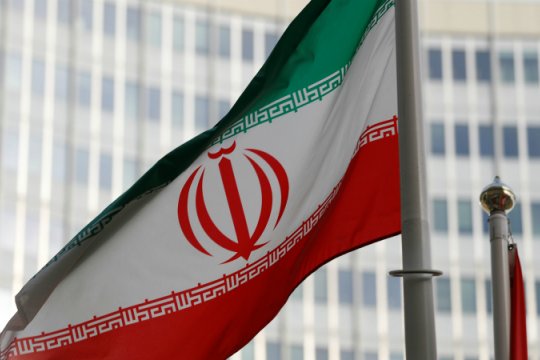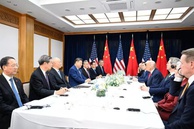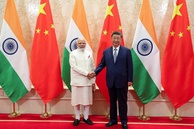The Islamic Republic of Iran (IRI) continues to be in the spotlight of global politics. And even though the "Iranian problems" go beyond the Joint Comprehensive Plan of Action (JCPOA), it is the “dying” JCPOA that is the main cause of tensions in and around Iran, be it the financial and economic blow of the United States, which uses the “oil baton” to strike at the Iranian economy, the threat of war in the Persian Gulf and tanker conflicts, or Iran’s geostrategic and regional position in general.
Regrettably, we have to admit that because of Washington’s destructive moves on the global scene the JCPOA is coming under corrosion and may well turn into dust in the near future. Such a negative outcome runs counter to the interests of Russia, China, and the European Union. Therefore, they are making tremendous efforts to preserve these agreements, even if in a slightly different format after the withdrawal of the US.
Political analysts reveal two conflicting views on the future of the JCPOA. Some are sure that the days of the nuclear deal are numbered. Others believe that it can still be “saved”, but this requires the concerted efforts of the countries participating in it.
On July 28, members of the Joint Commission on the Implementation of the JCPOA gathered in Vienna at the level of political directors to focus on pressing issues the JCPOA is confronted with. Participating in the meeting were delegations from Russia, China, Great Britain, France, Germany and Iran. They discussed the negative effect of Iran’s measures to curtail its commitments under the agreement thereby aggravating the situation in the Persian Gulf.
Iran’s partners called on Tehran to refrain from further withdrawal from a number of obligations under the JCPOA. The Iranian leaders have announced that, starting from May 8, they introduce 60-day rounds to gradually curtail compliance with the requirements of the JCPOA [1]. Early September will see a new, third phase of the Iranian struggle against US sanctions. The essence of such moves on the part of Iran is to force the European Union, and, first of all, Britain, France and Germany, to launch at full capacity the INSTEX settlement mechanism, which serves to guarantee the export of Iranian oil. Apparently, this presents a lot of difficulty and causes a lot of doubts among the founders of this financial mechanism.
Reporting on the Vienna consultations, Iranian Foreign Ministry spokesman Abbas Mousavi said that "the meeting in Vienna did not give us any guarantees about the future the JCPOA." He pointed out that Iran is not sure of the effectiveness of European efforts within the framework of INSTEX and, therefore, about maintaining the JCPOA. Iran will decide on further steps after the forthcoming ministerial meeting of countries that act as guarantors of the JCPOA, the diplomat said.
The head of the Russian delegation in Vienna, Deputy Foreign Minister Sergey Ryabkov, remarked in this connection: “We urged the Iranians to refrain from this [from the phased exit from the JCPOA, V.S.] and explained why: the more measures are taken to reconsider commitments, even if voluntary ones, the higher the political temperature and the higher the chances that some of the participants in the JCPOA may lose temper and trigger aggravation. ”[2]
The Russian diplomat went on to comment: “Certainly, you can follow this course, but it is getting ever more precarious. If we want Iran to refrain, and we also talked about this, the rest of the countries must redouble their efforts in order to provide Iran with an acceptable level of oil export despite all the odds and set the stage for at least some normalization of foreign economic activity.”[3]
To what extent is this possible amid the unprecedented US pressure on Iran? Federica Mogherini, head of the EU for foreign affairs, has cautiously suggested the possibility of intensifying the work of INSTEX. “The question whether INSTEX will deal with oil is currently being discussed by the shareholders,”- she said.[4]
But it is this very issue that determines Iran’s policy, and the choice of the directions of this policy clearly correlates with the following possible developments regarding the JCPOA.
The first way is possible if the authors of the JCPOA, the European Union, and other countries concerned can provide an “acceptable level of oil export”. In this case, Iran will return to the meticulous fulfillment of its nuclear deal commitments. However, there are great doubts that Iran’s partners will be able to satisfy its oil export needs.
American officials have warned European countries that they risk violating sanctions against Iran if they promote a barter system that could allow the export of Iranian oil. A senior White House administration official told Washington Examiner that the US Department of the Treasury had contacted the INSTEX Council to “signal dissatisfaction with the creation of a tool that helps to dodge sanctions and the dangers associated with it.”[5]
No matter how much European politicians and diplomats would like to support the JCPOA, it seems that European business is not ready to take chances with the US sanctions.
The American oil embargo has created a situation which is unparalleled, even compared to the tough international sanctions of 2012-2016. In July, the export of Iranian oil fell to 100 - 120 (taking into account condensate and light oil) thousand barrels per day [6]. In June, this indicator ranged between 300 and 500 thousand. In April 2018, Iran exported 2.5 million bpd [7], which is 25 times more than this July.
According to experts, to determine the exact amount of oil currently sold by Iran is difficult, since Tehran is using “gray” and other export options. However, the current estimates range within the above mentioned figures.
Thus, even if INSTEX begins to operate at its full “oil" capacity, even if oil is sold on a daily basis to China [8], Russia [9], and European countries, and even if the oil export is carried out with the use of all possible legal and semi-legal ways, it is unlikely that all this will compensate Iran’s losses in oil exports and, accordingly, in petrodollars.
However, even in the event of such a far from optimistic scenario, and even considering financial losses, Tehran will not profit from leaving the JCPOA, first of all, for political reasons.
The second option for Iranian policy, will most likely take shape in the context of the EU’s inability to circumvent US sanctions and thereby fulfill its obligations under the JCPOA. In this case, there could be two scenarios.
The first hypothetical option for Iranian policy amid INSTEX futility: Iran openly leaves the JCPOA. On July 29, the Iranian Foreign Ministry issued a statement in which it demanded yet again that European countries act on the conditions of the JCPOA. Otherwise, the statement said, Iran would cease to pursue its obligations under this agreement.[10]
As part of this option, Iran terminates the implementation of the Additional Protocol to the IAEA guarantees, [11] puts an end to the activities of the IAEA inspectors and control by the Agency, restores its nuclear potential and activates the implementation of its nuclear program under plans which were in force before the adoption of the JCPOA. In its most radical version, Iran withdraws from the Treaty on the Non-Proliferation of Nuclear Weapons (NPT).[12] Such a policy, in its best version for the Iranians, will lead to the complete isolation of Iran and the resumption of international sanctions, possibly under the patronage of the UN Security Council. At worst, it will lead to possible air and missile strikes by the United States and / or Israel at Iran’s nuclear facilities (let’s recall the troubled year 2012). Clearly, such a development does not suit anyone, first of all, Iran.
It should be borne in mind that the European Union (Britain, France and Germany), while opposing the United States on the JCPOA, backs Donald Trump and his team on other issues concerning Iran and its policies. These are as follows: Iran’s missile program, Tehran’s military and political activities in the Middle East, Iran’s support of Hezbollah, Hamas and other Shiite groups, which are deemed terrorist in most Western countries. Therefore, in the event of the collapse of the JCPOA, the EU will concentrate all its political, diplomatic and propaganda campaigns and, possibly, military potential, on Iran.
The second possible political option of Tehran in the conditions of INSTEX incapacity is the continuation of the policy which is currently pursued by the Iranian leadership. On the one hand, there is a well-structured and well-thoughtout phasing out of obligations under the JCPOA, which does not envisage going beyond the “red lines”. On the other hand, bringing partners as close as possible and at the same time lifting tensions in relations with opponents with a view to set the stage for negotiations
On January 29, 2019, addressing a conference on defense and security in Iran, Chief Military Advisor to the Commander-in-Chief and Supreme Leader of the Islamic Republic of Iran, Brigadier-General Yahya Rahim Safavi said that “the development of Iran’s strategic relations with global competitors of the United States, including Russia and China, is one of Iran’s major defense strategies.”[13]
In June, China and Iran held joint naval exercises at the strategic Strait of Hormuz.[14] In July, Iran unilaterally introduced a visa-free regime for citizens of China, as well as for residents of Hong Kong and Macau.[15]
According to Iranian politicians and political analysts, Russia is Iran’s strategic ally in the region and elsewhere in the world.[16] The Commander of the Iranian Navy, Rear Admiral Hossein Khanzadi, has said that Iran and Russia intend to step up maritime cooperation. According to the admiral, a memorandum of understanding was signed in Moscow on naval cooperation and the two sides plan joint military exercises in the Indian Ocean before the end of the year. "By the Indian Ocean, we mean a vast area in the northern part of the ocean, including ... the Strait of Hormuz, as well as the Persian Gulf."[17] Later, on July 30, the command of the Iranian Navy stated that Rear Admiral Khanzadi’s words about the location of the exercises were misinterpreted. He meant the northern part of the Indian Ocean and the Oman Sea.[18]
On August 1, the Russian Defense Ministry did not confirm either the signing of any document, or any plans for joint maneuvers of the Russian Navy and the Iranian Navy.
Judging by these facts, Tehran is trying to use Iran’s good relations with China and Russia for its political agenda and for an effective struggle against its antagonists.
Simultaneously, Iran is seeking to alleviate tensions with its opponents as part of its policy of moderate withdrawal from the JCPOA. A few days ago, Iranian Foreign Minister Mohammad Javad Zarif announced his country’s readiness for a dialogue with Saudi Arabia, Iran’s most fierce rival in the Middle East. The two countries disagree on many issues and support parties that are at war with one another.[19]
The most significant event of recent days is an appeal of the Iranian Foreign Minister Mohammad Javad Zarif to U.S. President Donald Trump to settle the differences between the two countries through negotiation and not succumb to the influence of advisers and allies, who, in his opinion, are pushing Washington into war with Tehran. As Mr. Zarif said “diplomacy is tantamount to common sense, not weakness.”[20]
The Iranian diplomacy is thus demonstrating political flexibility and, at the same time, pragmatism. It seems that Tehran is playing a simultaneous game with many parties and, an all likelihood, there are two major points for Iran to gain from these games.
The first is to prolong the time it takes to make drastic decisions. In any case, it will play for time until the presidential election in the United States, due to take place in November 2020, hoping for the victory of the Democrats and, accordingly, the revival of the JCPOA and the return of Iranian-American relations to the period of 2015-2016.
The second is to score as many points as possible on playing venues around the world to create favorable conditions for undoubtedly welcome future negotiations, in the first place, with the Americans, and, preferably, with a Democratic administration.
Despite its daring and independent position, Tehran has no other pragmatic choice but negotiations. In all likelihood, the American pressure on Iran under Donald Trump will not dwindle. Given the situation, Iran’s foreign policy of the near future will move along a thorny path full of unpredictable pitfalls and unexpected turns. But obviously, all these efforts are oriented at the only option possible - negotiations. Other ways are either unrealistic, or lead to war. And this, I dare say, is something no one wants, including the United States.
The opinion of the author may not coincide with the position of the Editorial Board
[1] For more details, see the website of the Journal International Affairs, 07/11/2019. [Electronic resource] - URL: https://interaffairs.ru/news/show/23124
[2] The site of the Atomic Energy 2.0 information portal. 07/31/2019. [Electronic resource] - URL: http://www.atomic-energy.ru/news/2019/07/31/96565
[3] RIA Novosti website, July 28, 2019, [Electronic resource] - URL: https://ria.ru/20190728/1556951938.html
[4] Washington Examiner Website July 26, 2019 [Electronic Resource] - URL: https://www.washingtonexaminer.com/news/us-warns-europe-not-to-develop-barter-system-to-evade-iran -sanctions
[5] Ibid
[6] Alex Lawler. Hit by sanctions and rising tensions, Iran's oil exports slide in July. Reuters website, July 30, 2019. [Electronic resource] - URL: https://www.reuters.com/article/us-oil-iran-exports/hit-by-sanctions-and-rising-tensions-irans- oil-exports-slide-in-july-idUSKCN1UP1UD
[7] Ibid
[8] US officials claim that companies from China purchased more than one million barrels of Iranian oil in June this year, violating US sanctions against Iran. In fact, not so much: only about 30 thousand barrels per day.
[9] In 2017, Russia and Iran struck the deal “oil in exchange for commodities”. Under the deal, Iran is to supply 100 thousand barrels per day to the Russian Federation, and about 5 million tons per year. Russia is to supply Iran with goods worth $ 45 billion a year (rails, railway rolling stock, locomotives, electrification of the railway). However, this transaction was not fully implemented. Now, the issue of filling this deal with more content is under discussion.
[10] Xinhua News Agency website, July 30, 2019. [Electronic resource] - URL: http://russian.news.cn/2019-07/30/c_138268072.htm
[11] An additional protocol to the IAEA guarantees provides for notifying the IAEA about the export - import of equipment that can be used to create nuclear weapons. The additional protocol expands the IAEA's rights while carrying out inspections by lifting the restrictions on the access of specific inspectors to nuclear facilities, simplifying the visa regime, envisaging the possibility of unannounced inspections and inspections with notification in less than 24 hours, using data on environmental control for the detection of undeclared activities, etc. Such a control system allows the IAEA to ensure that nuclear material is not reoriented from peaceful to military purposes.
[12] Iran considered withdrawing from the Treaty on the Non-Proliferation of Nuclear Weapons (NPT). A statement to this effect was made on April 28, 2019 by the Iranian Foreign Minister Mohammad Javad Zarif on national television, the Iranian news agency Mehr, April 28, 2019. [Electronic resource] - URL: https://en.mehrnews.com/news/144597/Leaving- NPT-one-of-Iran-s-numerous-options-FM-Zarif
The NPT is a multilateral international document developed by the UN with the aim of preventing the expansion of a number of countries possessing nuclear weapons and reducing the possibility of an armed conflict using such weapons. The agreement was approved on June 12, 1968 at the XXII session of the UN General Assembly, open for signing on July 1, 1968 in London, Moscow and Washington (depositories are Great Britain, the USSR and the USA). It entered into force on March 5, 1970. Currently, 190 states are signatories to the agreement (taking into account the DPRK exit).
[13] Website of IRNA, 01/28/2019. [Electronic resource] - URL: https://en.irna.ir/news/83187168/Establishing-ties-with-Russia-China-Iran-s-defense-approach
[14] The site of the information portal TEKNOBLOG, 07.27.2019. [Electronic resource] - URL: https://teknoblog.ru/2019/07/27/100475
[15] RIA Novosti website 07/31/2019. [Electronic resource] - URL: https://ria.ru/20190731/1557027575.html
[16] For more details see: Vladimir Sazhin. A strategic partnership between Russia and Iran at a new stage: what can we offer each other. pg. 11-24. Collection of the Russian Council on International Affairs (RF), the Center for the Study of Iran and Eurasia (IRI). Partnership between Russia and Iran: current status and development prospects. Report No. 29/2017. p.183. [Electronic resource] - URL: https://drive.google.com/file/d/1429O5mwxNeJD2u5cRrybZDl99Vjt6rc2/view
[17] The site of the Iranian News Agency Mehr, 07/29/2019. [Electronic resource] - URL: https://en.mehrnews.com/news/148230/Iran-Russia-to-carry-out-joint-military-drill-in-Indian-Ocean
[18] The site of the information portal Eadaily, 07/30/2019. [Electronic resource] - URL: https://eadaily.com/en/news/2019/07/30/vms-irana-utochnili-rayon-sovmestnyh-ucheniy-s-vmf-rossii
[19] The site of IA Regnum, 07/31/2019. [Electronic resource] - URL: https://regnum.ru/news/polit/2677619.html
[20] The site of IA TASS, 07/30/2019,. [Electronic resource] - URL: https://tass.ru/mezhdunarodnaya-panorama/6716517
read more in our Telegram-channel https://t.me/The_International_Affairs

 10:48 09.08.2019 •
10:48 09.08.2019 •



























